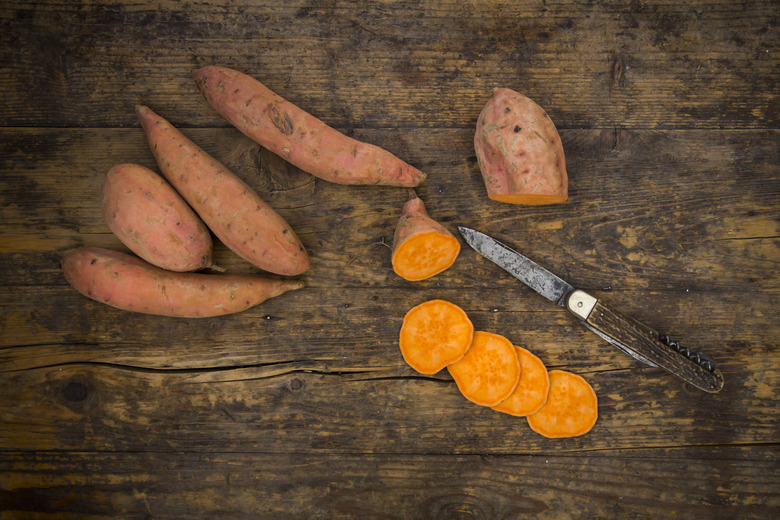Should You Give Your Dog Sweet Potato Treats
Dehydrated sweet potato dog treats have become a favorite among human food given to dogs. Sweet potatoes and yams, the brighter orange ones, are packed with nutrients like vitamin A, vitamin C, vitamin B6, calcium, potassium, magnesium, iron, and more. They also supply fiber to help keep the digestive tract moving. What's not to love? Well, there are some facts to consider before slicing up that orange tuberous root.
Potatoes contain harmful toxins
Potatoes contain harmful toxins
Recent reports of canine dilated cardiomyopathy (DCM) in breeds that are not known to have the disease genetically have linked the sudden heart symptoms and death partly to high concentrations of solanine, which is found in potatoes and some other foods. Both white and sweet potatoes contain solanine as a natural defense against pests that might bother the plant, acting as a pesticide. Any areas of the potato that appear green, have sprouts or eyes, or where the skin is damaged, have higher concentrations of solanine, which can cause an upset stomach, pain, nausea, vomiting, diarrhea, headache, fever, jaundice, dizziness, heart dysrhythmia, congestive heart failure, and sudden cardiac death.
Sweet potatoes appear to have less solanine than white potatoes, but the FDA issued a warning about giving any potatoes to dogs because of the possible side effects they can cause. They point out that most cases of DCM are genetic, but that food seems to be causing DCM in some dogs. Cases under investigation concern pet foods that are advertised as "non-grain," and therefore contain more vegetables including potatoes, dried peas and lentils, and other foods. If you've been giving sweet potatoes to your dog without problems, your dog is probably not one who would be affected by solanine. If you aren't sure, start by giving your dog a small amount of sweet potato and wait 24 hours to see what happens. To be safe, do not give your dog white potatoes.
Cook instead of dehydrating
Cook instead of dehydrating
The more solanine a dog eats, the more harmful it may be. Potato skins contain more solanine than the potato itself, so sweet potatoes should be peeled and then cooked, which eliminates most of the solanine. Many of the sweet potato recipes involve dehydrated sweet potato dog treats. Dehydration dries the potato slices so they are chewy and will last longer in the refrigerator or freezer. Dehydrating is not cooking, however, so to be safe, bake the sweet potato slices in a low oven for several hours instead.
One way to make sweet potato treats is to wash and peel the sweet potato, then slice it into coins that are at least one-quarter-inch thick. Thinner slices could get too crispy instead of chewy. Another method is to wash and peel the sweet potato or yam, then slice it lengthwise like fries. With either method, place them on a baking sheet lined with parchment paper and bake in a 250 degree Fahrenheit oven for three hours.
Potatoes are high in carbohydrates
Potatoes are high in carbohydrates
Another reason to go easy on feeding sweet potatoes to your dog is that they are high in carbs and dogs' bodies are designed to eat mostly meat, aka protein. Carbs have a way of adding unwanted weight to dogs, just like people, and too many carbs can lead to diabetes in dogs, as in people. There are just many more human foods you can supplement your dog's diet with besides those that are high in carbohydrates. If your dog loves sweet potatoes and suffers no ill effects from them, feeding them occasionally should be OK. But looking for other, healthier foods that don't come with warnings might be an even better idea.
Dehydrating other vegetables for dogs
Dehydrating other vegetables for dogs
Most other dehydrated vegetables for dogs are safe to feed them. Ones to avoid in any form include tomatoes and eggplant, which also have toxins related to solanine; allium family vegetables like garlic, onions, and chives; mushrooms; and avocado. Fruits can also be dehydrated or cooked in a low oven for several hours, except for grapes (along with raisins) and cherries, which are toxic to dogs. Be sure to remove all traces of the pits and seeds from fruit, because some (e.g. apple seeds) are very toxic to dogs.

